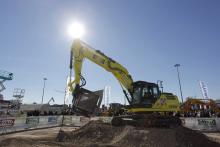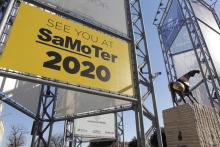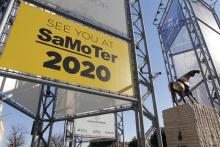India is the new focus for the world construction industry market. In 2015 there was a change in perspective in Asia, with demand for machines in China dropping in terms of construction growth. India posted growth of 5.3% during 2015, while China achieved growth of 4%.
This change at the top has been confirmed by the SaMoTer-Verona Outlook. This is a construction sector observatory group set up in partnership with Prometeia, the international economic consulting and research firm, with the support of Una
India is the new focus for the world construction industry market. In 2015 there was a change in perspective in Asia, with demand for machines in China dropping in terms of construction growth. India posted growth of 5.3% during 2015, while China achieved growth of 4%.
This change at the top has been confirmed by the323 SaMoTer-Verona Outlook. This is a construction sector observatory group set up in partnership with Prometeia, the international economic consulting and research firm, with the support of Unacea, the Italian Association of construction machinery and equipment manufacturers.
The overall results for 2015 highlight a slight upturn on the North American (+2.5%), Western European (+1.1%) and Japanese (+0.6%) markets as well as the continuing recession in Latin America (-2.6%) and Eastern Europe (-0.7%). The centre of gravity for the construction market over the last 15 years has gradually shifted eastwards, with the proportion of global investments covered by advanced countries down from 70% to 43% in favour of India and China.
The favourable period for the United States also continued in the first quarter of 2016: the USA is also expanding commercial construction (+10.8%) and especially roadworks (+14.9%). Europe in the first quarter of 2016 saw a strong recovery in investments in Germany (+2.3%), a slow resumption of the construction cycle in France (+0.4%) and continued decline in the United Kingdom (-0.5%) and Spain (-0.2%).
As regards the construction scenario in Italy, the slight downturn (-0.5%) posted in the first quarter of 2016 should not affect the overall recovery that began in 2015. According to estimates by Prometeia, 2016 will close with an increase of 1.6% and 2017 of 1.9% over the figures for 2015.
These are important signals with a view to the upcoming 30th SaMoTer (22-25 February 2017), Veronafiere’s triennial event dedicated to the construction machinery sector co-located with Asphaltica, the exhibition focusing on technologies and solutions for road paving, safety and road infrastructure.
As part of the construction sector, the world market for earth moving machines closed 2015 with 628,000 units sold, down by 14% compared to 2014. This negative result was especially the outcome of the sharp 24% drop posted in the last quarter of 2015. The SaMoTer-Veronafiere Outlook shows that the types of machinery in demand on construction sites are also changing: in five years, crawler excavators have dropped from 33% to 24% of total sales, while mini-excavators have improved from 15% to 24%.
The geographical balance between market shares also changed between 2010 and 2015: North America doubled its share (from 14% to 28%), China saw a downturn from 35% to 12%, while Western Europe managed to improve from 15% to 20% of total.
The climate of uncertainty also persisted in the first quarter of 2016, with 168,000 earth moving machines sold on a global scale, 4,000 less (-2.5%) than in the same period in 2014.
From January to March, of all types of machinery only mini-excavators (+8%) and skid-steer loaders (+5%) went against the general downward trend in demand.
In terms of geographical macro-areas, excellent sales results were seen in India (+28%), Western Europe (+11%) and Turkey (+37%) that became the leading central-eastern European market. China resumed growth again (+5%), while the first quarter closed on a negative note in North America (-3%), Russia (-21%) and Latin America (-40%).
This change at the top has been confirmed by the
The overall results for 2015 highlight a slight upturn on the North American (+2.5%), Western European (+1.1%) and Japanese (+0.6%) markets as well as the continuing recession in Latin America (-2.6%) and Eastern Europe (-0.7%). The centre of gravity for the construction market over the last 15 years has gradually shifted eastwards, with the proportion of global investments covered by advanced countries down from 70% to 43% in favour of India and China.
The favourable period for the United States also continued in the first quarter of 2016: the USA is also expanding commercial construction (+10.8%) and especially roadworks (+14.9%). Europe in the first quarter of 2016 saw a strong recovery in investments in Germany (+2.3%), a slow resumption of the construction cycle in France (+0.4%) and continued decline in the United Kingdom (-0.5%) and Spain (-0.2%).
As regards the construction scenario in Italy, the slight downturn (-0.5%) posted in the first quarter of 2016 should not affect the overall recovery that began in 2015. According to estimates by Prometeia, 2016 will close with an increase of 1.6% and 2017 of 1.9% over the figures for 2015.
These are important signals with a view to the upcoming 30th SaMoTer (22-25 February 2017), Veronafiere’s triennial event dedicated to the construction machinery sector co-located with Asphaltica, the exhibition focusing on technologies and solutions for road paving, safety and road infrastructure.
As part of the construction sector, the world market for earth moving machines closed 2015 with 628,000 units sold, down by 14% compared to 2014. This negative result was especially the outcome of the sharp 24% drop posted in the last quarter of 2015. The SaMoTer-Veronafiere Outlook shows that the types of machinery in demand on construction sites are also changing: in five years, crawler excavators have dropped from 33% to 24% of total sales, while mini-excavators have improved from 15% to 24%.
The geographical balance between market shares also changed between 2010 and 2015: North America doubled its share (from 14% to 28%), China saw a downturn from 35% to 12%, while Western Europe managed to improve from 15% to 20% of total.
The climate of uncertainty also persisted in the first quarter of 2016, with 168,000 earth moving machines sold on a global scale, 4,000 less (-2.5%) than in the same period in 2014.
From January to March, of all types of machinery only mini-excavators (+8%) and skid-steer loaders (+5%) went against the general downward trend in demand.
In terms of geographical macro-areas, excellent sales results were seen in India (+28%), Western Europe (+11%) and Turkey (+37%) that became the leading central-eastern European market. China resumed growth again (+5%), while the first quarter closed on a negative note in North America (-3%), Russia (-21%) and Latin America (-40%).







